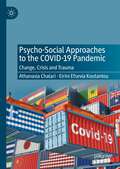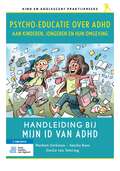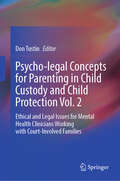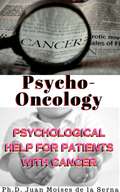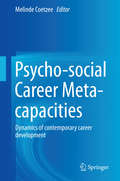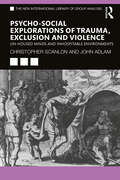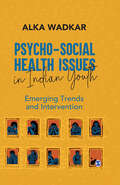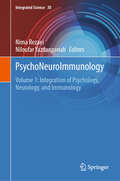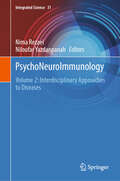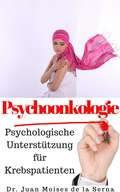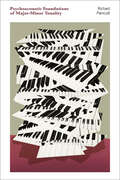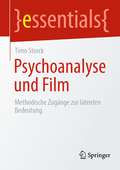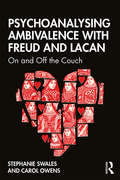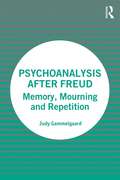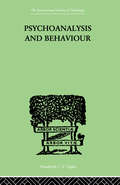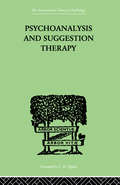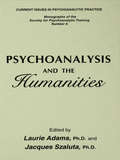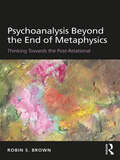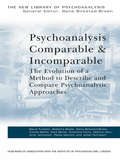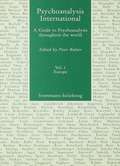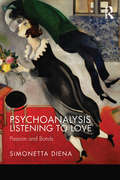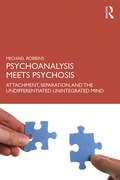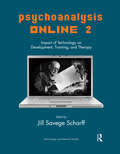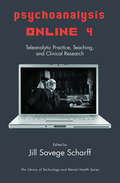- Table View
- List View
Psycho-Social Approaches to the Covid-19 Pandemic: Change, Crisis and Trauma
by Anathasia Chalari Eirini Efsevia KoutantouThis book explores how meaning-making during the COVID-19 pandemic, and specifically during the period of the April 2020 lockdowns, may be derived from shared lived experience among participants, residing in diverse geographical regions. This study conducted 46 in-depth interviews with Greek participants residing in 13 district countries and 23 cities around the globe and argues that meaning making of the pandemic derives from shared lived experiences of radical change and everyday transformations, fearful as well as well as hopeful perceptions of crisis and trauma emerging through loss of life before the pandemic.
Psycho-educatie over ADHD aan kinderen, jongeren en hun omgeving: Handleiding bij Mijn ID van ADHD (Kind en adolescent praktijkreeks)
by Sascha Roos Marleen Derkman Emilie van TeteringIn deze handleiding wordt een protocol voor psycho-educatie over ADHD gericht op kinderen en jongeren, hun ouders en school theoretisch onderbouwd en praktisch uitgelegd. Hiermee kunt u als behandelaar kinderen, jongeren en hun omgeving op gestandaardiseerde wijze uitleg geven over ADHD, zodat er aan het einde van de psycho-educatie sprake is van een beter idee (ID) van ADHD.Dit protocol voorziet in de behoefte om in Nederland op meer eenduidige en wetenschappelijk onderbouwde wijze psycho-educatie over ADHD te kunnen geven. Daarmee kan dit protocol dienen als uitgangspunt bij de noodzakelijke eerste stap in de behandeling van ADHD. Naast een theoretische inleiding op ADHD, bevat de handleiding een uitgebreide en concrete uitwerking van de psycho-educatie gericht op kinderen/jongeren, hun ouders en onderwijsprofessionals. Hiermee heeft de behandelaar een compleet en op elkaar afgestemd psycho-educatieprogramma in handen.Het bijbehorende werkboek ‘Mijn ID van ADHD’ is geschreven voor kinderen (8 t/m 12 jaar) en jongeren (13 tot 18 jaar) met ADHD. Hierdoor kan de behandelaar de psycho-educatie op maat en herhaaldelijk aanbieden.
Psycho-legal Concepts for Parenting in Child Custody and Child Protection Vol. 2: Ethical and Legal Issues for Mental Health Clinicians Working with Court-Involved Families
by Don TustinThis book provides an overview of changes in legislation in Australia concerning both family law and child protection law. The topic is important as the Australian Government has identified that the rate of mental disorder in some cohorts of children is high and rising. These cohorts of children live in families where they are vulnerable because they are exposed to risk factors that can be changed by a coordinated effort from parents, therapists, and lawyers. The aim of the book is to identify psycho-legal concepts that need to be understood by professionals who work in the fields of child custody and child protection, and to bring these concepts together to improve coordination between the two fields of practice. The purpose of the book is to be a practice manual for professionals from the disciplines of law, social work, and psychologists who work in specialized legal roles dealing with families where children are vulnerable to developing mental health difficulties. Volume 2 of the book provides a perspective from a mental health clinician about concepts and principles that arise in Australian family-oriented courts, and that need to be shared between disciplines. This book proposes that some concepts be identified as psycho-legal as the concepts need to be shared between disciplines who work with court-involved families. The book also proposes that psycho-legal concepts be shared between the jurisdictions of child custody and child protection. In this book, proposals are made to improve collaboration between disciplines and to maximize the best interests of children.
Psycho-oncology: Psychological Help for Patients with Cancer
by Juliana Arango Juan Moises de la SernaBook description: In this e-book, the problem of cancer is approached from a psychological point of view. Psycho-oncology is the name of the branch of psychology dealing with cancer. For this purpose, the latest research results on the topic are introduced in such a way that patients and their families can learn about the last findings with regards to the psychological aspects of cancer, its onset, development, and treatment. This reference e-book can help readers put one of the most common diseases today into perspective.
Psycho-social Career Meta-capacities
by Melinde CoetzeeThis book introduces a coherent perspective on the self-regulatory career meta-capacities that individuals, as career agents, need to successfully manage their career development in a boundaryless occupational world. Enriched by empirical data and case studies by subject specialists in the fields, it serves as a cutting-edge benchmark for specialists, professionals and post-graduate students in the careers field to study. This book allows an in-depth view of the most recent research trends on the critical psycho-social constructs influencing the adaptation, adaptivity, adaptability and employability of individuals in a turbulent, uncertain and chaotic work world. In addition, it offers the practising professional new perspectives of career constructs and measures to consider in career counseling and guidance for the contemporary career.
Psycho-social Explorations of Trauma, Exclusion and Violence: Un-housed Minds and Inhospitable Environments (The New International Library of Group Analysis)
by Christopher Scanlon John AdlamThe central theme of this book is the operation of intersecting discourses of power, privilege and positioning as they are revealed in fraught encounters between in-groups and out-groups in our deeply fractured world. The authors offer a unique perspective on inter-group dynamics and structural violence at local, societal, cultural and global levels, dissecting processes of toxic ‘othering’ and psychosocial (re-)traumatisation. The book offers the Diogenes Paradigm as a unique conceptual tool with which to analyse the ways in which those of us who come to be located outside or on the margins of dominant social structures are, in one way or another, the inheritors of the legacies of centuries of oppression and exclusion. This analysis offers a distinctive psycho-social redefinition of trauma that foregrounds the relationship between the inhospitable environments we generate and the experiences of un-housedness that we thereby perpetuate. Written in an engaging and accessible style, Psycho-social Explorations of Trauma, Exclusion and Violence directly addresses pressing global issues of racial trauma, human mobility and climate disaster, and offers a manifesto for the creative re-imagining of the places and spaces in which conversations about restructuring and reparation can become sustainable. This is an essential and compelling book for anyone committed to social justice, especially for all practitioners working in health, social care and community justice settings, and researchers and academics across the behavioural and social sciences.
Psycho-social Health Issues in Indian Youth: Emerging Trends and Intervention
by Alka WadkarPsycho-social Health Issues in Indian Youth: Emerging Trends and Intervention examines challenges to psycho-social health of Indian adolescents and youth. Exploring issues afflicting psychological, social and physiological well-being of the youth, the book recommends intervention and the way ahead. It links the theory to Indian scenario by giving real-life examples and incidences, which makes it interesting. The book studies emerging obstacles to psycho-social well-being from psychological, socio-cultural and biological perspectives. It examines issues such as pornography addiction, substance abuse and youth aggression. It further explores the effects of psychologically devastating events such as harassment, marital rape and emotional abuse. This book also analyses trauma and the alarmingly high suicide rates among adolescents and young adults. Everyday behavioural problems—that are often neglected—such as impact of gender socialization on individual’s personality and culture-based issues about marriage have been extensively studied. It further examines the distress and mental turmoil caused by the COVID-19 pandemic. The book seeks to examine the consequences, as well as potential antidotes, to the modern-day challenges to psycho-social wellness and well-being.
PsychoNeuroImmunology: Volume 1: Integration of Psychology, Neurology, and Immunology (Integrated Science #30)
by Nima Rezaei Niloufar YazdanpanahThis book seeks to represent the main concepts and theories related to psychoneuroimmunology with the aim of their application in clinical settings and formation of novel theories to further elucidate the mutual connection of the psyche and the physiology of humans' body. Psychoneuroimmunology, as an integration of popular research fields such as psychology, immunology, neurology, and neuroscience, is a perfect example of interdisciplinary and transdisciplinary studies that could potentially result in developing alternative diagnostic tools and treatment strategies besides facilitating the understanding of the pathophysiology of some conditions that might not properly be understood with a single point of view. Considering the stressful lifestyle and the high prevalence of neuropsychiatric, metabolic, and immune-related disorders, psychoneuroimmunology could be the path to the management of these conditions and reduction of the burden of the diseases
PsychoNeuroImmunology: Volume 2: Interdisciplinary Approaches to Diseases (Integrated Science #31)
by Nima Rezaei Niloufar YazdanpanahThis book seeks to represent the main concepts and theories related to psychoneuroimmunology with the aim of their application in clinical settings and formation of novel theories to further elucidate the mutual connection of the psyche and the physiology of humans' body. Psychoneuroimmunology, as an integration of popular research fields such as psychology, immunology, neurology, and neuroscience, is a perfect example of interdisciplinary and transdisciplinary studies that could potentially result in developing alternative diagnostic tools and treatment strategies besides facilitating the understanding of the pathophysiology of some conditions that might not properly be understood with a single point of view. Considering the stressful lifestyle and the high prevalence of neuropsychiatric, metabolic, and immune-related disorders, psychoneuroimmunology could be the path to the management of these conditions and reduction of the burden of the diseases.
PsychoOnkologie
by Juan Moises de la Serna Cristina De SousaIn diesem E-Buch wird das Problem der Krebserkrankung aus psychologischer Sicht nähert, dessen Bereich der Studie ist in Psychoonkologie angegeben. Zu diesem Zweck wird die neueste Forschung im Zusammenhang mit diesem Bereich angeboten, so dass der Patient und seine / ihre Verwandten wissen können, die neuesten, die in Bezug auf die psychologischen Aspekte des Aussehens, der Erhaltung und Behandlung von Krebs entdeckt wurde. Eine Beratung E-Buch, das die Krankheit, die eine der am häufigsten heute geworden ist, zu relativieren helfen kann
Psychoacoustic Foundations of Major-Minor Tonality
by Richard ParncuttA fascinating interdisciplinary approach to how everyday Western music works, and why the tones, melodies, and chords combine as they do.Despite the cultural diversity of our globalized world, most Western music is still structured around major and minor scales and chords. Countless thinkers and scientists of the past have struggled to explain the nature and origin of musical structures. In Psychoacoustic Foundations of Major-Minor Tonality, music psychologist Richard Parncutt offers a fresh take, combining music theory—Rameau&’s fundamental bass, Riemann&’s harmonic function, Schenker&’s hierarchic analysis, Forte&’s pitch-class set theory—with psychology—Bregman&’s auditory scene, Terhardt&’s virtual pitch, Krumhansl&’s tonal hierarchy. Drawing on statistical analyses of notated music corpora, Parncutt charts a middle path between cultural relativism and scientific positivism to bring music theory into meaningful discourse with empirical research.Our musical subjectivity, Parncutt explains, depends on our past musical experience and hence on music history and its social contexts. It also depends on physical sound properties, as investigated in psychoacoustics with auditory experiments and mathematical models. Parncutt&’s evidence-based theory of major-minor tonality draws on his interdisciplinary background to present a theory that is comprehensive, creative, and critical. Examining concepts of interval, consonance, chord root, leading tone, harmonic progression, and modulation, he asks:Why are some scale tones and chord progressions more common than others?What aspects of major-minor tonality are based on human biology or general perceptual principles? What aspects are culturally arbitrary? And what about colonial history?Original and provocative, Psychoacoustic Foundations of Major-Minor Tonality promises to become a foundational text in both music theory and music cognition.
Psychoanalyse und Film: Methodische Zugänge zur latenten Bedeutung (essentials)
by Timo StorckDieses essential widmet sich der Verbindung von Psychoanalyse und Film. Die Psychoanalyse eignet sich für eine methodisch geleitete Filmbetrachtung. Dabei kommt es nicht zu einer Anwendung der psychoanalytischen Theorie, sondern zu einer Anwendung ihrer Methode eines reflektierten In-Beziehung-Stehen zu einem Gegenüber. So können latente Bedeutungen in den Blick genommen und eine Interpretation entwickelt werden. Im vorliegenden essential werden die Möglichkeiten eines solchen Zugangs rekonstruiert und bestehende Ansätze vorgestellt. Schließlich wird der Vorschlag eines Leitfadens zur Durchführung einer filmpsychoanalytischen Interpretation gemacht. Zahlreiche Filmbeispiele dienen dabei der Veranschaulichung.
Psychoanalyse und soziale Ungleichheiten - Gesellschaftliche Machtverhältnisse auf der Couch (Kritische Sozialpsychologie)
by Nicole Burgermeister Lalitha Chamakalayil Esther Hutfless Barbara ZachDieser Sammelband geht den unbewussten Wirkungsweisen gesellschaftlicher Machtverhältnisse nach und plädiert dafür, diese auch in der klinischen Praxis zu adressieren und zu analysieren. Darüber hinaus werden in den verschiedenen Beiträgen Themen wie die Bedeutung von Normierungsprozessen in Gesellschaft und Psychoanalyse, die Auseinandersetzung mit Rassismus, Kolonialismus, Antisemitismus, Sexismus, Ableismus, Queer- und Transfeindlichkeit in psychoanalytischer Theorie, Praxis und Ausbildung sowie die Auswirkungen von Rassifizierungsprozessen und Klassenunterschieden in Psychotherapien beleuchtet. Die Autor:innen verbindet die Überzeugung, dass die Psychoanalyse – ihren eigenen Ausblendungen und Reproduktionen von Machtverhältnissen zum Trotz – kritisches, emanzipatorisches und widerständiges Potential in Bezug auf gegenwärtige gesellschaftliche und individuelle Entwicklungen bietet. Mit Beiträgen von Mai-Anh Boger, Elisabeth Brainin, Nicole Burgermeister, Lalitha Chamakalayil, Stephen Hartman, Bernd Heimerl, Esther Hutfless, Kimberlyn Leary, Patricia Porchat, Samy Teicher, Beatriz Santos, Barbara Zach und anonymen Autor:innen.
Psychoanalysing Ambivalence with Freud and Lacan: On and Off the Couch
by Carol Owens Stephanie SwalesTaking a deep dive into contemporary Western culture, this book suggests we are all fundamentally ambivalent beings. A great deal has been written about how to love – to be kinder, more empathic, a better person, and so on. But trying to love without dealing with our ambivalence, with our hatred, is often a recipe for failure. Any attempt, therefore, to love our neighbour as ourselves – or even, for that matter, to love ourselves – must recognise that we love where we hate and we hate where we love. Psychoanalysis, beginning with Freud, has claimed that to be in two minds about something or someone is characteristic of human subjectivity. Owens and Swales trace the concept of ambivalence through its various iterations in Freudian and Lacanian psychoanalysis in order to question how the contemporary subject deals with its ambivalence. They argue that experiences of ambivalence are, in present-day cultural life, increasingly excised or foreclosed, and that this foreclosure has symptomatic effects at the individual as well as social level. Owens and Swales examine ambivalence as it is at work in mourning, in matters of sexuality, and in our enjoyment under neoliberalism and capitalism. Above all, the authors consider how today’s ambivalent subject relates to the racially, religiously, culturally, or sexually different neighbour as a result of the current societal dictate of complete tolerance of the other. In this vein, Owens and Swales argue that ambivalence about one’s own jouissance is at the very roots of xenophobia. Peppered with relevant and stimulating examples from clinical work, film, television, politics, and everyday life, Psychoanalysing Ambivalence breathes new life into an old concept and will appeal to any reader, academic, or clinician with an interest in psychoanalytic ideas.
Psychoanalysis After Freud: Memory, Mourning and Repetition
by Judy GammelgaardThis book draws on a number of Freud's lesser-known works to explore psychoanalytic perspectives on memory, mourning and repetition. It is remarkable that Freud in his speculations on the human psyche often took his point of departure in an insignificant detail. It might be a lapse of memory or a detail in a piece of art. From here he uncovered the many layers of the psyche, its complex structure and the processing of meaning right to the limit of understanding. At this point Freud´s exploration encountered the unknown, an internal outland as difficult to acknowledge as the external reality. Freud did not invent the unconscious but he demonstrated how it works. The unconscious according to Freud does not exist, but insists on making itself visible. The eleven essays in this book draw a picture of the critical humanistic thinking so characteristic of Freud. His concepts and suppositions were the result of many years’ speculations, based on observation, experience and ideas, and although they are marked by the time and culture from which they emerged, they demonstrate a revolutionary knowledge of the psyche transcending the knowledge of his time. In her reading of the chosen texts the author has chosen the position of a contemporary interpretation. Examining how psychoanalytic work on the topics of memory, mourning and repetition has changed since Freud and how these themes remain of crucial importance in contemporary psychoanalytic theory, this book intersperses theory with clinical practice. It will be of great interest to training and practicing psychoanalysts, as well as scholars of art, literature and sociology.
Psychoanalysis And Behaviour (International Library Of Psychology Ser.)
by Tridon, AndrFirst Published in 1999. Routledge is an imprint of Taylor & Francis, an informa company.
Psychoanalysis And Suggestion Therapy: Their Technique, Applications, Results, Limits, Dangers And
by Stekel, WilhelmFirst Published in 1999. Routledge is an imprint of Taylor & Francis, an informa company.
Psychoanalysis And The Humanities
by Laurie Adams Jacques SzalutaFirst published in 1996. Routledge is an imprint of Taylor & Francis, an informa company.
Psychoanalysis Beyond the End of Metaphysics: Thinking Towards the Post-Relational
by Robin S. BrownWinner of the Theoretical Category of the American Board & Academy of Psychoanalysis Book Prize for best books published in 2016 Psychoanalysis Beyond the End of Metaphysics offers a new paradigm approach which advocates reengaging the importance of metaphysics in psychoanalytic theorizing. The emergence of the relational trend has witnessed a revitalizing influx of new ideas, reflecting a fundamental commitment to the principle of dialogue. However, the transition towards a more pluralistic discourse remains a work in progress, and those schools of thought not directly associated with the relational shift continue to play only a marginal role. In this book, Robin S. Brown argues that for contemporary psychoanalysis to more adequately reflect a clinical ethos of pluralism, the field must examine the extent to which a theoretical commitment to the notion of relationship can grow restrictive. Suggesting that in the very effort to negotiate theoretical biases, psychoanalytic practice may occlude a more adequate recognition of its own evolving assumptions, Brown proposes that the profession’s advance requires a return to first principles. Arguing for the fundamental role played by faith in supporting the emergence of consciousness, this work situates itself at the crossroads of relational, Jungian, and transpersonal approaches to the psyche. Psychoanalysis Beyond the End of Metaphysics will be of significant interest to all psychodynamically oriented clinicians, alongside scholars of depth psychology and the philosophy of mind. It will also be helpful to advanced and postgraduate students of psychoanalysis seeking to orient themselves in the field at present.
Psychoanalysis Comparable and Incomparable: The Evolution of a Method to Describe and Compare Psychoanalytic Approaches (The New Library of Psychoanalysis)
by David TuckettHow do we know when what is happening between two people should be called psychoanalysis? What is a psychoanalytic process and how do we know when one is taking place? Psychoanalysis Comparable and Incomparable describes the rationale and ongoing development of a six year programme of highly original meetings conducted by the European Psychoanalytic Federation Working Party on Comparative Clinical Methods. The project comprises over seventy cases discussed by more than five hundred experienced psychoanalysts over the course of sixty workshops. Authored by a group of leading European psychoanalysts, this book explores ways for psychoanalysts using different approaches to learn from each other when they present their work to fellow psychoanalysts, and provides tools for the individual practitioner to examine and improve his or her own approach. As described in detail in its pages, sticking to the task led to some surprising experiences, raising fundamental questions about the way clinical discussion and supervision are conducted in psychoanalysis. Well known by many in the psychoanalytic community and the object of much interest and debate, this project is described by those who have had the closest contact with it and will satisfy a widely held curiosity in psychoanalysts and psychotherapists throughout the world. David Tuckett is winner of the 2007 Sigourney Award.
Psychoanalysis International, V.1: A Guide to Psychoanalysis Throughout the World (Psychoanalysis International Ser. #2)
by Peter KutterIt is well known that the cradle of psychoanalysis was in Vienna, the scene of Sigmund Freud's activities at the beginning of the century. But how and when did psychoanalysis reach the other countries of Europe? What development did it undergo there? How did the different mentalities, political and cultural backgrounds as well as the personal particularities of its respective advocates affect psychoanalysis? What was its position in the past and what is its position today? These and other questions on the varied development and the present situation of psychoanalysis in the countries of eastern and western Europe are investigated by renowned psychoanalysts drawing on the experience and knowledge acquired in their own work. The result is a new conpendium on psychoanalysis in Europe containing all up-to-date information. Informative and instructive, at times as exciting as a detective story, Psychoanalysis International will possibly be of interest even to non-analysts.
Psychoanalysis Listening to Love: Passion and Bonds
by Simonetta DienaThis book is about love, about how we fall in love and why we fall in love, and about how much we suffer if unable to love or be loved. The need to love and be loved can be read as the prototype of every human need and every relationship between human beings. To be loved is wishing to be seen, known, recognised for what we are in our deepest and most hidden inner self, in our wildest desires to live and be free. It is a need for knowledge, gratefulness and recognition. Literature, cinema and our very experience of life tell us about it. By listening to love, can psychoanalysis add anything further and new to what has already been said by culture, art and by our life experiences? In psychoanalysis, the events of love can be understood by going back to the most primitive forms of human relationships, that is, to the earliest childhood experiences.
Psychoanalysis Meets Psychosis: Attachment, Separation, and the Undifferentiated Unintegrated Mind
by Michael RobbinsPsychoanalysis Meets Psychosis proposes a major revision of the psychoanalytic theory of the most severe mental illnesses including schizophrenia. Freud believed that psychosis is the consequence of a biologically determined inability to attain and sustain a normal or neurotic mental organization. Michael Robbins proposes instead that psychosis is the outcome of a different developmental pathway. Conscious mind functions in two qualitatively different ways, primordial conscious mentation and reflective representational thought, and psychosis is the result of persistence of a primordial mental process, which is adaptive in infancy, in later situations in which it is neither appropriate nor adaptive. In Part I Robbins describes how the medical model of psychosis underlies the current approach of both psychiatry and psychoanalysis, despite the fact that neuroscience has failed to confirm the model’s basic organic assumption. In Part II Robbins examines two of Freud’s models of psychosis that are based on the assumption of a constitutional inability to develop a normal or neurotic mind. The theories of succeeding generations of analysts have for the most part reiterated the biases of Freud’s two models, so that psychoanalysis considers the psychoses beyond its scope. In Part III Robbins proposes that the psychoses are the result of disturbances in the attachment-separation phase of development, leading to maladaptive persistence of a primordial form of mental activity related to Freud’s primary process. Finally, in Part IV Robbins describes a psychoanalytic approach to treatment based on his model. The book is richly illustrated with material from Robbins’ clinical practice. Psychoanalysis Meets Psychosis has the potential to undo centuries of alienation between society and psychotic persons. The book offers an understanding of severe mental illness that will be novel and inspiring not only to psychoanalysts but to all mental health professionals.
Psychoanalysis Online 2: Impact of Technology on Development, Training, and Therapy (The Library of Technology and Mental Health)
by Jill Savege ScharffThis book addresses the impact of technology and the Internet in four parts: on development, on the training of therapists, on professional ethics, and on the provision of psychotherapy and psychoanalysis. It brings an immersion in the issues of clinical work with patients in analysis and therapy.
Psychoanalysis Online 4: Teleanalytic Practice, Teaching, and Clinical Research (The\library Of Technology And Mental Health Ser.)
by Jill Savege ScharffPsychoanalysis Online 4: Teleanalytic Practice, Teaching, and Clinical Research brings a systematic, qualitative research perspective to the question of the effectiveness of teletherapy, teleanalysis, and teleteaching. It suggests that, contrary to some traditional arguments, effective treatment, teaching, and supervision can take place remotely; that affect and imagination are more important than physical presence. Providing theories of therapeutic action as well as philosophical reflections, the book features examples of online clinical cases, including crisis interventions by email, and aims to stimulate openness to innovation, responsible process and review. Each contributor presents their clinical qualitative research and survey study findings. The Bernardi Three-Level Model, developed for assessing therapeutic change in the traditional analytic setting, is applied to the study of teleanalysis with different patients. It is found that, in videoconference or even in email communication, the sense of closeness in the therapeutic encounter does not depend on physical proximity but on integrity and commitment. The book concludes with research findings on the effectiveness of videoconference compared to in-the-classroom settings for teaching psychodynamics, supervising psychotherapy, and conducting psychotherapy with Chinese students. It will be of great interest to a variety of professionals and researchers who practise remotely, with particular relevance for those situated in the fields of psychoanalysis and psychotherapy.
